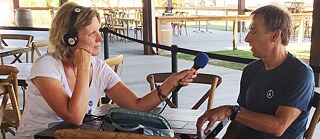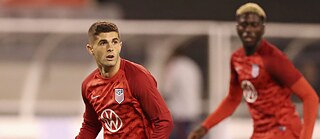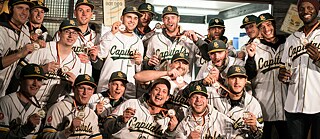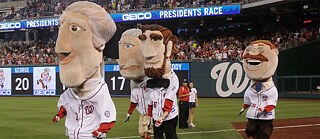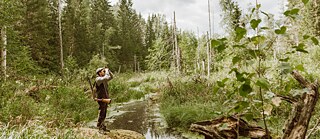Mehr als ein Turnier
Klinsmann in California
Er ist eine deutsche Fußball-Legende, als Spieler wie als Trainer: Jürgen Klinsmann. Im Sommer 2018 rief er den SilverLakes Cup ins Leben, ein internationales Jugend-Fußball-Turnier in Südkalifornien.
Diese Folge anhören: Apple Music | Spotify | Download
Diese Folge stammt von Kerstin Zilm, die 2003 als Leiterin des ARD‑Hörfunkstudios an der US‑Westküste nach Los Angeles kam. Nachdem diese Aufgabe beendet war, entschloss sie sich dazu, in Kalifornien zu bleiben. Sie gründete ihre eigene Produktionsfirma und arbeitet seither als freiberufliche Autorin und Journalistin. In diesem Podcast unterhält sich Kerstin Zilm mit Fußballfans, Trainern und Spielern. Das Foto zur Folge zeigt Jürgen Klinsmann und Kerstin Zilm im Gespräch. Außer dieser Episode hat Kerstin Zilm die Folgen „A Day With John Lennon“ und „Villa Aurora and Thomas Mann House in Los Angeles“ produziert.
Transkript
Kerstin Zilm: He is a soccer legend in Germany, as player and as coach: Jürgen Klinsmann. He also coached the U.S. men’s soccer team: and was fired from that job in 2016. Jürgen Klinsmann has anything but retired. Now, he created an international youth soccer tournament in Southern California — the SilverLakes Cup. In the summer of 2018, teams from Mexico, the United States, and from Germany came to play.
[SOUNDS FROM THE SOCCER FIELD]
It is hot. Breathtaking, sweat-dripping hot. 108 degrees Fahrenheit hot. There is no shade on the 24 full-size soccer fields of the Silver Lakes Sports Complex in Norco, one hour east of downtown Los Angeles. On one of the fields, with perfectly green fresh grass, young athletes in black and yellow jerseys play as if it were a cool spring day. They chase the ball, pass down the field, and jump high into the air trying to drill headers between the goalposts. It’s the U-19 team — young players under 19 — of BVB Dortmund, one of the most legendary and successful clubs of Germany’s Bundesliga. They are practicing for the inaugural edition of the International SilverLakes Cup, which is starting in two days.
Benjamin Hoffmann: Of course, if we start to play, we want to win.
Kerstin Zilm: This is Dortmund coach, Benjamin Hoffmann. The team has come to California a day earlier than the competitors. This is already their third practice in two days.
Benjamin Hoffmann: It’s a competition. It’s a challenge against a new team. It’s against international teams. It’s also for the boys to experience another culture. It’s not only the tournament, it’s also to get in touch with American people — how they live, get to know the people better. So maybe the boys learn something out of that to make them better men.
Kerstin Zilm: It will be exciting, the coach says, to play a tournament against youth teams from Mexican Liga MX and the MLS: Guadalajara Club Atlas, Club Tijuana, LA Galaxy, Real Salt Lake, and Real So Cal. Dortmund will also face two teams they know from playing in Germany: their Bundesliga rivals VfB Stuttgart, and the current German U-19 champion, Hertha BSC Berlin. To be part of the inaugural edition of the International SilverLakes Cup is special, Hoffmann says, also because of the person who initiated the tournament: Jürgen Klinsmann.
Benjamin Hoffmann: It all begins with an email from Jürgen Klinsmann to our marketing department — and we were all excited to go. It was L.A., a brilliant city. It was also the name of Jürgen Klinsmann, to get to know him, get in touch with him. In Germany, of course, he is really famous. For us he is a hero. We are all excited to meet him. So we said: yeah, let’s do it.
Kerstin Zilm: Not everybody in the United States knows Jürgen Klinsmann. In Germany, he is a soccer legend. Klinsmann was a striker for top teams in the Bundesliga, in Italy, France, and England. This son of bakers — who grew up in a small village in the south German region of Swabia — was the German top scorer in 1988.
[HISTORICAL SOUND FROM GAME COMMENTARY]
Commentator: Klinsmann stretches in, and he got it into the corner ...
Kerstin Zilm: As striker for the German team, he won the World Cup in 1990 and the European Championship in 1996.
Commentator [IN GERMAN]: Aus, aus das Spiel ist aus, Deutschland ist Weltmeister ...
Kerstin Zilm: These are just a few highlights of his career as a soccer player. Then, in 2004 he became coach of the German national soccer team and led it to third place in the 2006 World Cup. Five years later Klinsmann was hired as head coach of the U.S. men’s team.
Jürgen Klinsmann [ON MSNT]: What I really want to do over the next weeks and months is to get as much information as possible to understand the culture within the Federation, the resources ...
Kerstin Zilm: Klinsmann won a lot of fan support leading the U.S. team out of the so-called ‘group of death’ at the following World Cup in 2014. But the qualification for 2018 didn’t go well, and he was fired from the job in November 2016.
Now here, on the sidelines of Southern California’s soccer fields, Klinsmann looks like just another soccer enthusiast — a very fit and athletic one. His blond hair is cropped short. He is wearing khaki shorts, T-shirt, and blue suede sneakers. He does not seem to be affected by the heat at all — just very excited to have the first team practicing for the tournament he helped create.
Jürgen Klinsmann: We want them to experience not only a wonderful tournament, from a soccer point of view. But also, we want them to experience how other teams function, what Southern California is like. Just to really get an impression about Los Angeles and this area that they never experienced before.
Kerstin Zilm: Having been a very competitive player, he understands and supports each team’s ambition to win. But, Klinsmann says, this tournament aims to deliver more for players and coaches. Some of them have traveled very far to be part of the event. The German athletes sat in tight airplane seats for more than 14 hours to get here. They — and most of the Mexican players — have never been to California, not even to the United States. They only know the country from movies, books, and video games. None of them has gotten up close and personal with competitors from a different country for a few days. This is all about to change.
Jürgen Klinsmann: It’s always the first impression you get of a place where you travel to that leaves a mark for your entire life. We just would love to see these teams to experience the cultural elements of Southern California: the open-mindedness, from the beach to the Inland Empire. Just take it all in and make your own judgment, and take those thoughts and feelings home. And I think if they do that with an open mind, they will be blown away.
Kerstin Zilm: When the teams are not competing on the pitch, they will stay together in a dorm at UC Irvine, visit the Santa Monica Pier, watch a surfing competition, see Hollywood studios, and see the local NFL team, the Los Angeles Rams, practice.
Dortmund’s practice is over. The players walk into the club house’s air-conditioned restaurant and choose from a buffet of salads and burgers. Team captain Patrick Osterhage admits that they still have to adjust to California’s time zone and climate:
Patrick Osterhage [IN GERMAN]: Ist natürlich sehr warm, auch mit dem Jetlag vielleicht noch ein bisschen anstrengend, aber es macht auf jeden Fall auch sehr viel Spaß trotz der Hitze ...
Kerstin Zilm: Even with heat and jet lag it is fun to play, the tall 18-year-old with broad shoulders and blond hair says, wiping sweat from his forehead. Playing against ambitious opponents for 90 minutes is a challenge the team is looking forward to, he concludes, as much as getting to know players from other countries.
Patrick Osterhage [IN GERMAN]: Auf solchen Turnieren ist es ja auch dass man sich mit den anderen Mannschaften unterhält. Sport verbindet ja auch ...
Kerstin Zilm: Sport can connect people, he says, and given everything that is happening in politics, this tournament might even set an example for connecting across borders.
Patrick Osterhage [IN GERMAN]: Ich glaube, dass man da ein Zeichen setzt mit dem Sport gegen die Politik, oder so in die Richtung.
Kerstin Zilm: This is exactly what Klinsmann has in mind. He gets excited talking about connections being made during the coming week on and off the field.
Jürgen Klinsmann: We want them to come out of their shell. Leave your comfort zone — meaning your team environment, specifically. Go to the other players, ask them questions. And who knows, maybe there are some friendships they are making in the dorms of UC Irvine for a lifetime. Maybe they exchange phone numbers and stay connected on social media. And maybe one kid goes to Berlin next year and has a place to stay.
News Anchor: Another heatwave is bringing triple-digit temperatures to the Inland Empire.
Kerstin Zilm: It stays hot in Southern California. Initially, Klinsmann wanted to have games played all day on one field. Now, two games are happening at the same time, with the final whistles blowing at 1:30.
[SOUNDS FROM THE SOCCER FIELD]
Kerstin Zilm: Fans are looking on from bleachers and the sidelines. 15-year-old Sebastian Silvian wears a FC Barcelona jersey. He sits with his mom between two soccer fields, on folding chairs under a colorful umbrella. They drove almost an hour to watch high-level games from international teams.
Sebastian Silvian: We have never seen other teams from other parts of the world and thought we might as well come here and see how they play. So in the future, when I come here and play myself, I can see what is new and what is going on.
Kerstin Zilm: Sebastian just joined a soccer academy that is practicing at SilverLakes Sports Complex. He wants to become a professional soccer player in the Spanish League and represent the United States in the World Cup of 2026, which will be played in the U.S., Mexico, and Canada. So far, he is impressed by the strength and quickness of the German players — but not by their strategy.
Sebastian Silvian: As far as I can see they are just defending. They are just holding back, not really pressuring right now. They are dominated. What they are doing is holding back, just maintaining.
Kerstin Zilm: Mark Partida and his daughter Natalia also brought their own umbrella, and stuck it between two benches on the bleachers. They are both in shorts and polo shirts, Natalia with a long ponytail, watching Dortmund playing Real Salt Lake. Mark has taken a day off from work to take Natalia to the tournament.
Mark Partida: I wanted her to watch just a little bit of the pace. The guys attack so fierce. We just wanted to see a higher level of play on the pitch.
Kerstin Zilm: Natalia, a high school junior, hopes to get a soccer scholarship to pay for college. To be able to watch young athletes from three different countries compete in her sport is priceless, she says.
Natalia: If you want to see these type of teams, usually you have to go pretty far just to get one game. Here we have a bunch. I think it’s really cool. It is really fast-paced. You can tell they work really hard, even if it is really hot outside. They look really good.
Kerstin Zilm: Natalia has never heard of Jürgen Klinsmann. She is more interested in the U.S. women’s team. When she learns about some highlights of the German soccer legend’s career, she is even happier to have come to the tournament.
Natalia: I think that’s really cool! From being a player and a coach, and then here in the United States ... that is pretty amazing. It sounds like a dream come true.
Kerstin Zilm: Finally, after three days of group games, the players enjoy a day off at the ocean. A light fog coming in from the water does not stop them from taking videos and jumping into the Pacific.
[SOUNDS FROM THE BEACH]
Kerstin Zilm: Then it’s time for barbeque, beach soccer, and people-watching. When they first arrived at the dorm and the sports complex, most of them were shy and stayed among their own group of players. Then they met on the field, played video games together, helped each other using the laundry machines — and shared other chores, like getting water for the dormitory rooms and taking the trash out. They also connected on their tours to Southern California’s sightseeing attractions. Everybody is very happy to be part of this experience.
College Players’ Voices: It’s a different world. We come from Germany. It is good to see there is another world, other people — they are very nice to us. That’s good to see. Today, we are just at the beach having a good time, bonding with each other and the other teams. It’s a really good experience. This is so pretty and the people are very friendly. Playing with my friends and being in the ocean. Everything was nice. Like, here we got food, we got water, we got everything. It was a nice week.
Kerstin Zilm: The coaches enjoy talking about practice and game strategy among themselves — and getting some insights from Jürgen Klinsmann. Most of all, they love watching the young players opening up and learning more about other countries, their culture, their language — and of course, their way of playing soccer. Martin Vasquez from Real Salt Lake and Atlas coach Omar Flores:
Martin Vasquez: Our players become better, more mature, more intelligent. They see the level — a higher level — and that is very motivating and very helpful to be able to develop that in them.
Omar Flores: It is very good for our young players to come and see and play with these kinds of teams. They have good players — another kind of size of the body, and very good technique to play. In this kind of tournament, it’s a party. We have to enjoy seeing the union of the players.
[SOUNDS FROM THE SOCCER FIELD]
Kerstin Zilm: The final has come. Two German teams face each other: 2018 Under 19 champion, Berlin, in blue and white, and the 2017 champion, Dortmund, in black and yellow. The opponents are fighting hard under the relentless sun to become the first-ever team to win the SilverLakes Cup trophy. The game is streamed live online.
Commentator: On the attack here. Michael Brink cuts it back, defender falls for Dortmund — that one still alive. And ... outside the goal ...
Kerstin Zilm: On the soccer fields around them, boys and girls from Southern California youth clubs are practicing while parents and coaches watch on the sidelines.
Jürgen Klinsmann leans over the guardrail of an elevated platform, next to the field where Dortmund and Hertha are fighting it out. A few minutes before the end, he sits down to share his thoughts about the tournament during the live streaming.
Jürgen Klinsmann: Having three Bundesliga teams coming over, joining this week of under 19 soccer, is a real treat for everyone involved. I think all the teams — also the two Mexicans that came in from Guadalajara and Tijuana — experienced a very special place where we live here.
Commentator: Here is a chance, second half — a goal. It’s in! A banger of a goal, Hertha make it two ...
Kerstin Zilm: Hertha Berlin wins the final, three to one, and Jürgen Klinsmann hands the crystal bowl over to the young men in blue and white. Then it is time for them to shower and head to the airport with the other teams from Germany and Mexico.
One exciting week has come to an end. They will come home exhausted and exhilarated at the same time, with new phone numbers, videos, and pictures saved on their smartphones. What exactly this experience means for their lives might only sink in a few weeks from now. It might just have changed a few players’ lives, Jürgen Klinsmann says. He hopes that all of this is just a beginning:
Jürgen Klinsmann: We envision this a yearly event, on this high quality under 19 level. And our wish is that from the players who come through this year-by-year tournament — we see them one day in the national teams, playing for their countries.
Kerstin Zilm: The coolest thing, of course, would be for them to meet again in eight years ... playing for their countries in the 2026 World Cup.



